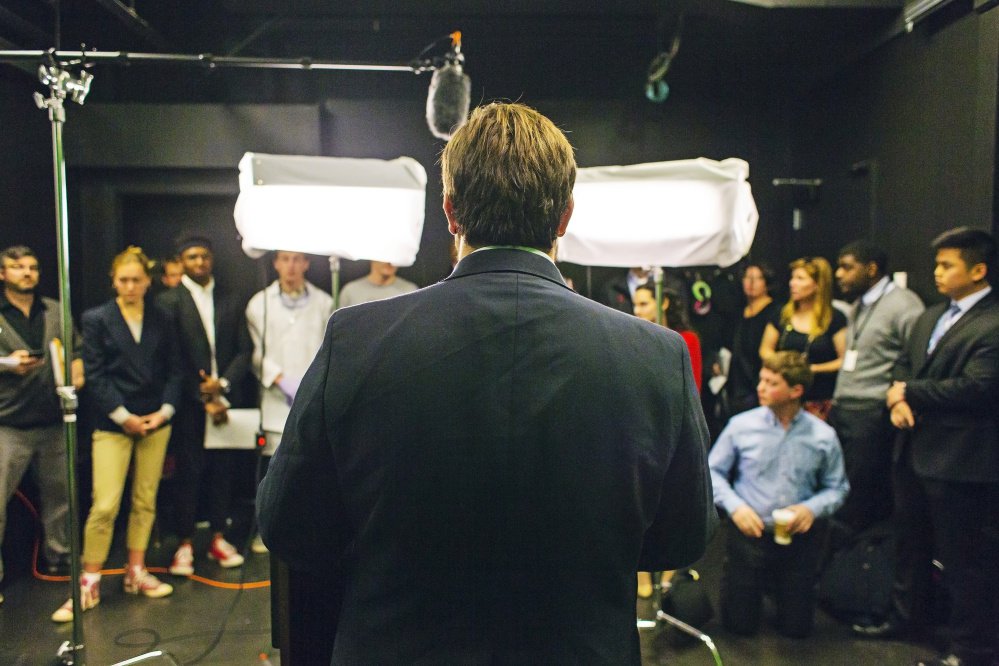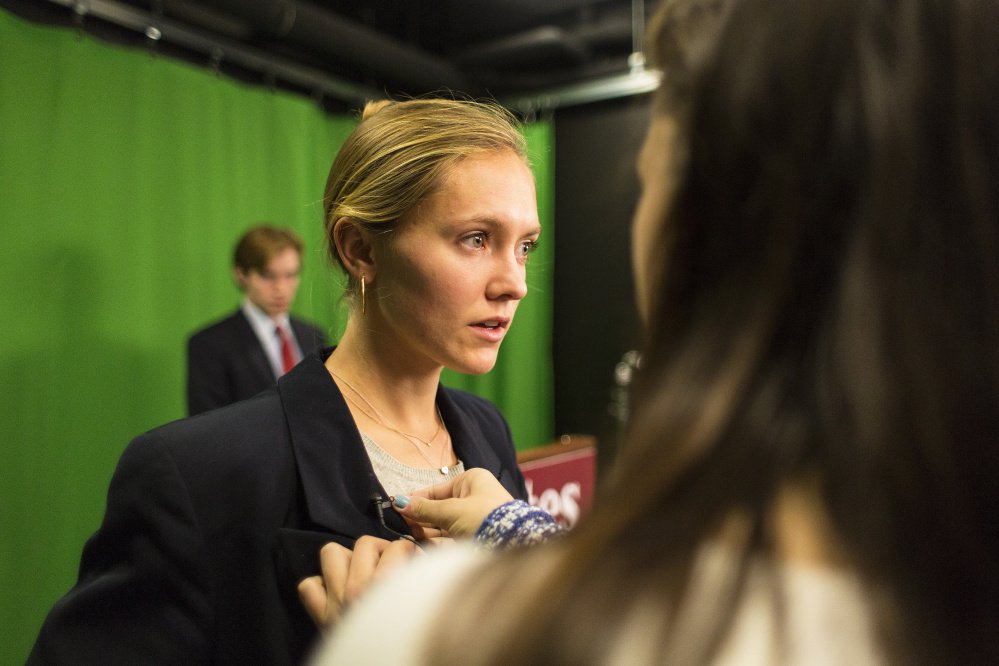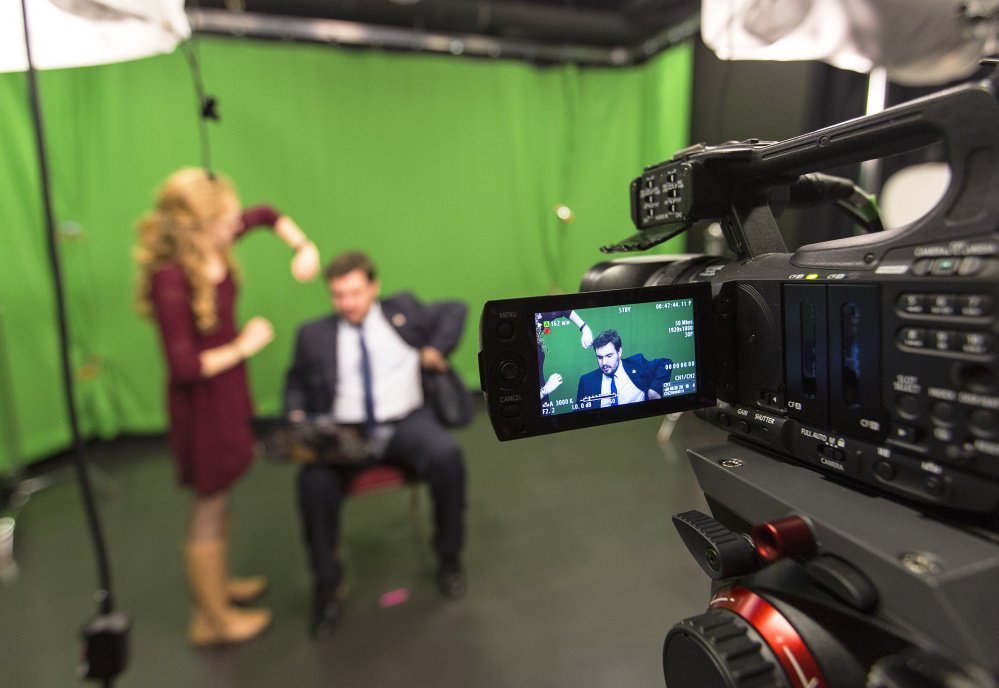LEWISTON — Gabriel Nott stands at the lectern, speaking in a measured tone as he addresses the nation, trying to calm the public about reports of smallpox victims in multiple states. A question from a blogger about forcibly detaining those who refuse vaccination rattles him before he settles down to clarify his position.
A few minutes later, the red “On Air” light goes off, and Nott unhooks the mic from the lapel of his blue blazer and heads for the door.
“Oh my gosh,” Nott says immediately, dropping his calm demeanor and holding his head in his hands as he walks double-time along the basement hallway. “That was SO stressful!”
Nott, a Bates College senior majoring in rhetoric, is playing the role of a Democratic presidential candidate in a mock campaign, part of a semester-long exercise for one of the most popular classes on campus: a course on presidential campaign rhetoric.
The mock campaign has taken on more significance for the students – some of whom are voting for a president for the first time this year – as it unfolds against the backdrop of the historic, unpredictable and real-life presidential campaign between Democratic nominee Hillary Clinton and Republican nominee Donald Trump.
It’s that intersection of real presidential politics and the mock campaign that brings home how the students are sharpening their political acumen through their class.
“It’s one of the most famous classes at Bates,” said Honor Moshay, a senior majoring in politics who is the social media manager for the mock Republican candidate, Molly Chisholm. “I’ve known about it since my first year. The whole school just really gets into it.”
That’s because a huge number of the roughly 1,800 students on campus are playing a role: Students in the presidential campaign rhetoric class run the campaigns. First-year seminar students take the role of bloggers and journalists covering the campaign. More than 600 students in 20 other Bates classes are “registered voters,” and the candidates drop by those classes to give speeches and policy talks, seeking their votes. A website links to Facebook, Twitter and websites for each campaign. They hold mock party conventions that are open to the campus – and there are hundreds of designated voters that will turn out on election day, Nov. 8, the same date as the real Election Day.
A DOZEN-PLUS CLASSES INVOLVED
So far, the Republican nominee is doing pretty well in the polls, said rhetoric professor Stephanie Kelley-Romano.
She knows that because a sociology class is doing the polling as part of their coursework. Students studying disease outbreaks in a class on mathematical models in biology are being called on to brief the campaigns on smallpox and the spread of contagion during the exercise. All told, more than a dozen classes on campus are doing some task tied to the mock campaign. Even the music department is involved, composing campaign music for the conventions and the inaugural ball.
Keeping up on the real-world politics and running the mock campaign at the same time sets a frantic pace for both the students and for Kelley-Romano, who has been teaching the campaign rhetoric class since 1999.
“When (the class) happens in an election year, it’s actually almost too much. Our time has been torn between ‘What did Megyn Kelly say to Newt Gingrich, and what did John Oliver say about that?’ versus what’s been going on in the mock campaign,” said Kelley-Romano, referring to a recent sharp exchange between the Fox News host and the former speaker of the House, a Trump supporter. “For students, it probably does make it a little more frantic.”
But on a recent Tuesday, chaos is the plan. Kelley-Romano has sprung the smallpox outbreak on her students for a four-hour-long lesson in crisis communications.
Three hours into the smallpox “crisis,” Moshay is shaking from caffeine and adrenaline as she pounds out a statement. “I feel like this has lasted three days already,” she says to no one in particular. “Do we say the (infected) students were in Greenland?” she asks the candidate.
“No,” Chisholm says firmly. “President Obama doesn’t come out and say everything he knows.”
For Moshay, a Democrat, playing the part of a Republican made her appreciate the national political landscape.
“It made it really fun, and also made it difficult” to go against her political instincts, she said. “But there’s something to be said for the millions who love Trump.”
THE REAL CAMPAIGN MATTERS, TOO
Nott says that while the mock campaign is “stressful,” the real presidential campaign is “surreal.”
“It’s as fascinating as it is terrifying to be in this moment and know that this is history in the making,” said Nott, 22, a registered Democrat who initially supported Bernie Sanders and now plans to vote for Clinton. “It’s amazing to be watching this election and thinking that 20 or 25 years down the road, kids will be learning about this election and I’ll be talking about the rise (of Trump) from this joke of a candidate to nominee of a major party.”
Several of the students said it’s common to hear their fellow students talking about Trump and Clinton, and strategizing about whether to vote in Maine or their home states to make the biggest impact.
Moshay, from solidly blue California, will cast her first presidential vote in Maine, she said.
“People are feeling like their vote matters more here,” Moshay said. “The only kids I know who are voting in their home state are in swing states.”
Lewiston is in the hotly contested 2nd Congressional District, where Trump, who has made five visits to Maine this year, has a chance of winning an electoral vote. Maine is one of two states that can split its electoral votes.
“There is a sense of urgency I have,” said Matthew Baker, 22, a rhetoric major who is the Republican vice presidential candidate in the mock campaign.
“I’m not really a fan of either candidate. I just want to do what I can to keep our country afloat.”
Send questions/comments to the editors.






Success. Please wait for the page to reload. If the page does not reload within 5 seconds, please refresh the page.
Enter your email and password to access comments.
Hi, to comment on stories you must . This profile is in addition to your subscription and website login.
Already have a commenting profile? .
Invalid username/password.
Please check your email to confirm and complete your registration.
Only subscribers are eligible to post comments. Please subscribe or login first for digital access. Here’s why.
Use the form below to reset your password. When you've submitted your account email, we will send an email with a reset code.